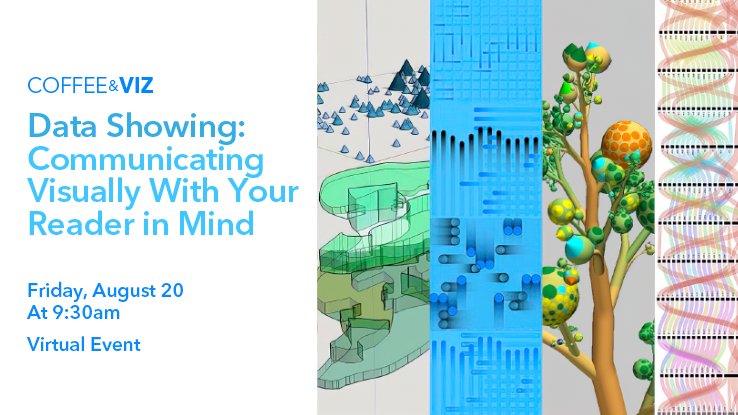
Coffee & Viz returns Aug. 20

What does data look like through a social justice lens? How do marginalized communities establish safe spaces online? Learn how researchers are answering these questions and much more at the Libraries’ popular Coffee & Viz series this fall semester. The series showcases the unique ways that researchers at NC State and elsewhere are using visualization to enhance their scholarly work.
Coffee & Viz programs will be held virtually this fall and are free and open to the public. Attendees will be entered into a drawing to receive (via mail) their choice of a coffee bag or tea tin and a mug from locally owned sweet shop Anisette. Register to attend these programs at the links below.
To receive announcements of upcoming events, join the NC State Visualization Interest Group.
The Coffee & Viz fall 2021 season is as follows:
Data Showing: Communicating Visually With Your Reader in Mind
Friday, Aug 20, 9:30 a.m.-10:30 a.m.
Data visualization for the purpose of analysis is not the same as data visualization for communication. Visualizations created for non-technical experts or to communicate to everyday lay-readers require different presentation models than those used in the scientific realms. Building on her work as co-PI for an Institute for Emerging Issues-supported project on mapping local North Carolina community "Data Stories," Dr. Deborah Littlejohn, Associate Professor of Graphic Design in the College of Design, will present a reader-centric approach to data presentation that uses principles from user experience and graphic design with the goal of helping data readers craft narrative understandings of the information.
Visualizing the “Invisible”: Methods for Trans Digital Spaces
Friday, Sept. 17, 9:30 a.m.-10:30 a.m.
How do marginalized people carve out and stitch together spaces, knowledge, and cultures of their own, while navigating political economies of oppression? Specifically, how do digital environments afford and limit trans people in their production of culture, access to accurate medical knowledge, and their sense of self? Dr. Jen Jack Gieseking will present their latest research exploring these questions. Their next paper dives into issues of data ethics in social media, using the case study of trans Tumblr data and thereby weighing the benefits and detriments of this data as both a site of cultural production and health knowledge within the trans community. Gieseking is an Associate Professor of Geography at University of Kentucky and author of the recent book, A Queer New York: Geographies of Lesbians, Dykes, and Queers (NYU Press, 2020).
Visualizing Collaborative Learning
Friday, Nov. 5, 9:30 a.m.-10:30 a.m.
Collaborative learning is both complex and dynamic, and something of a black box to researchers and practitioners. This talk will discuss how to visualize dynamic and complex collaborative learning processes, using the StoryQ project as an exemplar learning context. StoryQ is an NSF-funded project with a goal to engage high school students in hands-on practice and critical thinking about how AI (Artificial Intelligence) works and its impacts on our current and future lives and jobs. Dr. Shiyan Jiang, Assistant Professor of Learning Design and Technology in the College of Education, will describe a visualization pipeline (workflow) for qualitative research, with a special focus on a qualitative analysis of high school students' processes of building machine learning models. This pipeline could be widely adapted to other learning contexts to address research questions related to revealing patterns in learning processes.
Exploring Race and Place through Data: The W.E.B. Du Bois Visualization Exhibit
Friday, Nov. 19, 9:30 a.m.-10:30 a.m.
In addition to his substantial contributions to sociology and civil rights activism, W.E.B. Du Bois was an early champion of using data to investigate and highlight the history and reality of Black Americans. In particular, Du Bois’s visualization contributions to the 1900 Exposition Universelle in Paris provided a powerful lens through which to understand the progress made by Black Americans—and especially Black Southerners—since Emancipation in the mid-nineteenth century. In this talk, Ph.D. student Alexander Yoshizumi will explore Du Bois’s data visualization contributions to the 1900 Exposition Universelle and discuss the inspiration behind the W.E.B. Du Bois Visualization Exhibit at NC State University. Circumstances allowing, a selection of exhibit contributors will also showcase their work and share their ongoing research related to racial justice and equity.
Interested in contributing to the Du Bois exhibit? Apply by the Sept. 30 deadline here.